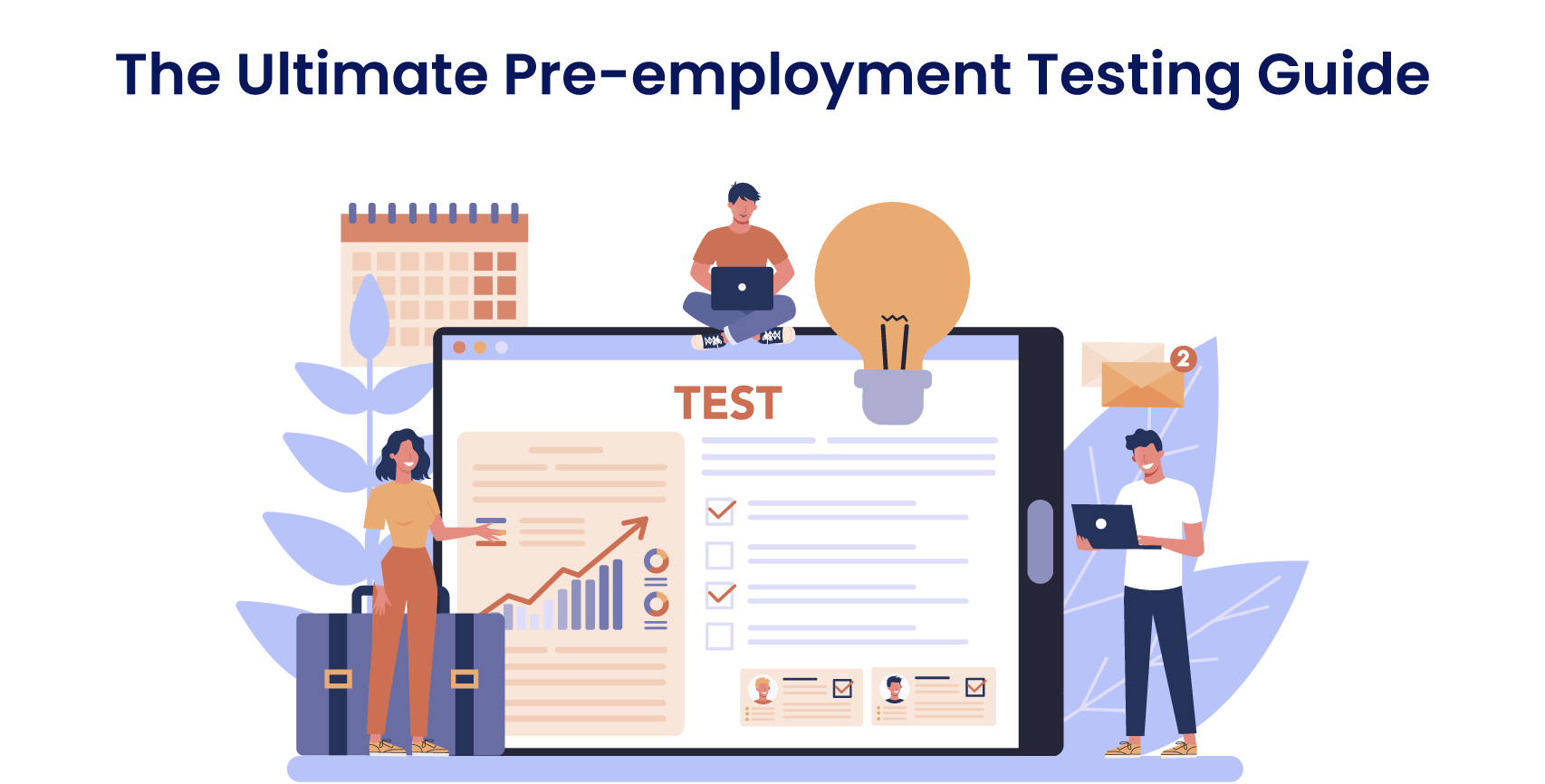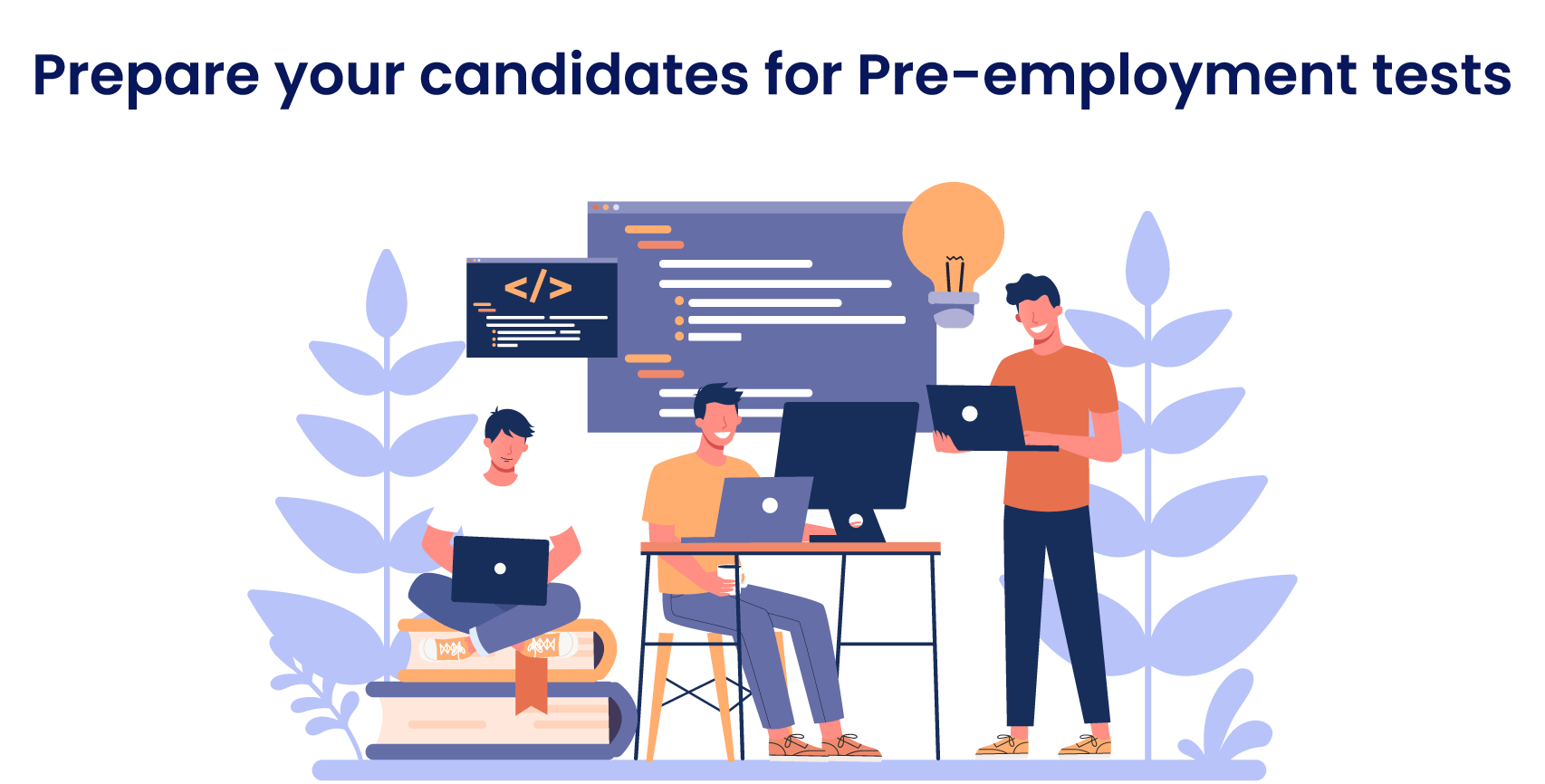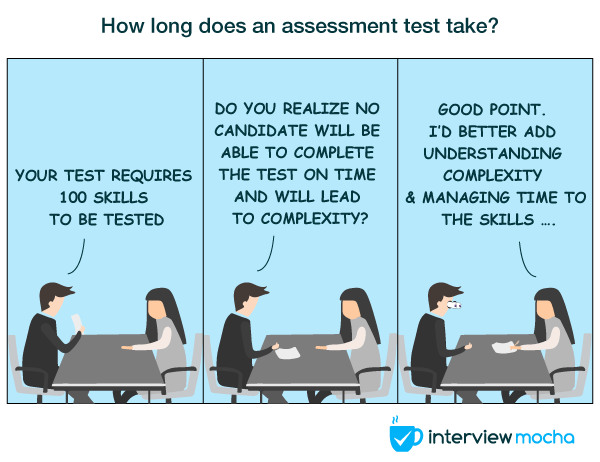
So, your candidates are preparing for their first job or next job, and in most cases, these candidates would be anxious thinking about the interview process. iMocha is a skill assessment platform used by 5000+ companies of all sizes across the world to assess candidates. We understand that giving the best in the test is important for the candidate and your company. Here we have tried to answer some of the common questions that can help your candidates perform well in their upcoming tests.

Pre-employment screening tests are mainly used to identify the right candidate from the talent pool and assess the skills, job readiness, personality traits, and predict future job performance. Pre-employment tests are beneficial for employers as well as candidates. For companies, it has helped recruiters and hiring managers to have better clarity about what they want, provides a relatively high degree of accuracy, saves time and cost. Candidates get the benefit of appearing for the test at any time, at any place and in their own familiar, stress-free environment.

Job assessment tests only assess skills according to the job role. That means all the questions will be relevant, and the candidate will be able to answer all those questions. They are not measured on the basis of fail or pass but for competence in the specific job role. In order to identify a job-fit candidate, the employer can assess job-related skills, cognitive ability, personality and culture-fitness of the candidate. So, there might be different types of job assessment tests used to evaluate a candidate. The pre-employment test evaluates the hard skills and soft skills of the applicants. An employer can use one or more combinations of the following tests:
1. Skill tests: These tests evaluate the ‘job-related’ skills of the candidate. The skills may include both soft and hardcore skills that are mandatory to perform the given task. EEOC guidelines suggest that these skill tests must be relevant to the actual job description.
2. Cognitive tests: These tests evaluate the ability of a candidate to gather information, process it, memorize it, and decision-making skills of the candidate.
3. Physical ability tests: These tests evaluate whether the candidate is physically fit to perform job operations that need physical activity.
4. Personality tests: These tests evaluate if the personality of a candidate is more suitable for the success of the job.
5. Background tests: These tests will evaluate the background of the candidate, like employment history, bankruptcy, drug addiction, fraudulence, or criminal offense of the candidate.
6. Language tests: These tests will evaluate the ability of a candidate to communicate (verbally and written) in a specific language.
.png)
Employers use pre-employment tests to find the applicants whose skills are best suited for the job position to which they have applied. The pre-employment screening test is conducted at the initial phase of the hiring process to evaluate certain traits of the applicants to predict future performance. To get the dream job in almost every organization, candidates will have to clear the pre-employment assessment. So, to pass an employment assessment, the candidate will have to keep the following things in mind:
1. Consider the job role: With the help of pre-employment testing, employers want to predict if a candidate is a job fit applicant for the open position. They will try to evaluate the candidate's responses to questions that indicate your behavioral characteristics and job readiness.
2. Know what you are being tested on: The test may contain a variety of questions to measure the candidate's job skills, work ethic, work management, time management, ambition, and passion for working for the organization. Once the candidate figures out the intent of the questions, they can respond in a better way.
3. Practice, practice, and practice: Candidates need to gain an understanding of the type of questions that will be asked during the pre-employment assessments. The candidate's test score will lead them to their dream job. How to know the types of questions a screening test will consist of? Here, candidates can refer to various online materials available on pre-employment testing to improve their skills and test performance. With the help of these sources, they can fine-tune their reasoning, logic, and job skills by solving the practice questions and taking lessons from the experts.
4. Be honest: When it comes to personality and psychological screening, candidates shouldn't hide what kind of personality they have. They should avoid manipulating their responses to get a higher ranking or score. Because pretending to be someone else will not help the candidate pass this section of the tests. The pre-employment tests contain a few questions specifically designed to detect applicants manipulating their responses. Employers can always prefer another criterion for selecting their employees.

The answer to this question depends on the type of assessment and the number of questions. There is no standard time mention for completing the test. The stipulated time for a pre-employment assessment is generally shared with an invitation the candidate receives from the employer.
Yes. Pre-employment testing is legal. It's not about the test but about the implementation of the test that needs to be carefully observed. Pre-employment testing, Section 703(h) of the Act suggests that an employer asking for the test or assessment is totally fair, but the test should not include any discrimination on the basis of race, sex, gender, religion, or the age of the candidate appearing for the test.
The use of third-party pre-employment tests is legal, and it's also beneficial in the interest of both employers and employees. Employers can avoid issues from the right to privacy by outsourcing assessment to third-party. In this way, an employer cannot access the candidate's responses but only the end result of the testing. This eliminates the possibility of bias.
The time required for drug test results depends on the result of the drug testing. It usually takes 24 hours for the test results. If tests are positive, the medical review officer may perform a second round of drug testing to ensure the results are not false positives. This may take another 4-5 days.
Drug Testing: This process may take 4-5 days if the results of tests are positive.
Saliva Testing: This process may take 1-3 days to attain the results.
Hair Testing: Hair testing can detect drug usage until 90 days before the test date. This process takes 2-3 days to complete.
Urine Testing: In the case of a negative urine test, it takes 2-3 days. A positive urine test may extend this process to 4-5 days.
Blood Testing: Blood testing results are available within 24hrs of testing. In case of a positive test, it may take 2-3 days to complete the results.
The candidate must share the medications currently in use, including prescription, over the counter or herbal medications. The candidate also needs to provide information about the prescriber and proof of prescription for reference.
In the case of a government job, they will reject the employment offer if the drug testing results are positive. If a job is critical for the safety of the people, it is mandatory for the employers to reject employment to candidates with positive drug test results as per drug free workplace act of USA.
For most private companies, it is not mandatory to levy drug testing laws. But private companies in some states are rewarded for implementing drug-free workplaces.
Drug testing is considered to be more personal, and a special process is followed while performing a drug test.
In the case of candidates, employers need to issue a notice to candidates that a drug test is needed for the job and a list of drug tests to be conducted. Candidate needs to sign a release at the time of the drug test so that employers get a copy of the result. If the candidate passes a drug test, employers will invite them for further process. If employers want to reject a candidate based on a negative drug test, they will have to share a copy of the drug test results with the candidate.
In the case of employees, access to drug test results varies based on whether the employer needs to maintain medical report records or not. If employees are exposed to harmful drugs and medical records are maintained by the company, in this case, employees have access to their results. Occupational safety and health administration (OSHA) explains various use cases of access to employee exposure and medical records standards in detail.
Employers use psychological tests to see if the candidate’s character traits are best suited for the job. Although there is no right or wrong method to pass personality tests, candidates can try a few things that might help them with their tests.
Practice Test:
Some platforms allow your candidates to practice psychological tests. However, the actual assessment tests will not be similar to these practice tests, but your candidates will get an idea about the type of questions asked in a personality test.
Think according to job role:
Your candidate can consider the job role and think about the traits that can help to be successful in the job. E.g., suppose your candidate is applying for a customer support role. In that case, there might be questions that can gauge their ability to solve problems, patience while handling critical situations, and communication skills. So when attempting these questions, be aware that the employer is looking for these traits, and the candidate has to respond accordingly. It is always good, to be honest with your personality and reflect on that while responding to questions.
Avoid stress:
Candidates might feel stressed while appearing for the personality tests as they are expected to open up about their personality. This can put them under tremendous pressure and hamper their responses. So, they have to try to be relaxed and confident while attempting questions. This will improve their chances of getting genuine responses to the situation-based questions.
A pre-employment background check is performed to validate the information provided by the candidate. This may include an employment check, drug test, credit check, and education check. A pre-employment background check is mainly done through a third party or, in some cases, by the company itself. Employers can perform one or more combinations of the following background checks.
Employment check:
For an experienced candidate, the employer may check their previous work history, date of joining and leaving, or the reason for leaving the organization. Employers try to find a candidate's behavior in the past organization. An employer may ask the candidate to provide references from the organization or personal references.
Drug testing:
Employers may check the candidates for drug consumption. An employer can ask a candidate for a drug test after providing a conditional offer. If the results of drug tests are positive, they might lose their employment offer.
Criminal background check:
Employers run a check on the candidate's criminal records to ensure the candidate doesn't have any criminal record in the past.
Credit Background Check:
Employers perform a credit check to see a candidate's credit-to-debt ratio, bankruptcy, or fraudulence.
An employment check is performed to verify the information given by the candidate about past employment and salary is true. An employer may check the start and end dates of employment, the reason for leaving the job and candidates. Employment check can be helpful in identifying true work experience of the candidate. An employment background check can be done through various ways as mentioned below.
An employer can contact the HR department of a previous company and ask about the feedback. The employer sometimes appoints a third party background check company to verify the information.
Employers may ask for personal or professional references to contact and verify the previous employment. Here, the candidate might have to provide a reference for each employment. The candidate can list one or more colleagues from their workplace or educational mentor or personal references.
Apart from this, employer can build their own contact list for references and verify the details mentioned in the resume.
It’s an important part of the hiring process and employee benefits for every organization. Pre-employment physical basically ensures the current health status and physical well-being of the new hires.
The pre-employment medical check consists of the following steps, but they may change as per the job role and need.
1. Complete medical & physical examination
2. Laboratory investigations
3. X-Ray chest
4. ECG
5. Lipid profile
6. Kidney function test
7. Liver function test
8. Optional tests
It’s a very rare situation when applicants do not get through pre-employment physical or medical examinations due to health issues and previous injuries. The organization will not exclude the candidate because of their health issues. Only health problems that affect the specific needs of the job role will be taken into consideration.
An organization cannot reject an applicant based on the pre-employment test that tells their disability which is not going to hamper the job performance. Suppose the applicant is fit for the open job. According to the EEOC guidelines, organizations need to make necessary changes to the workplace to support the applicant to perform the job.
